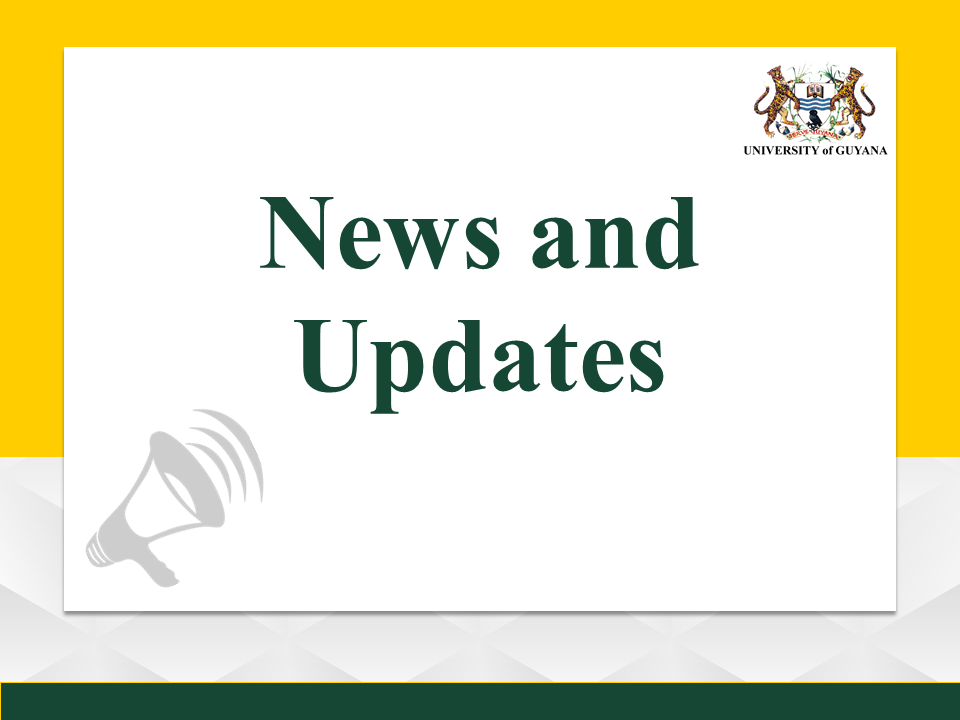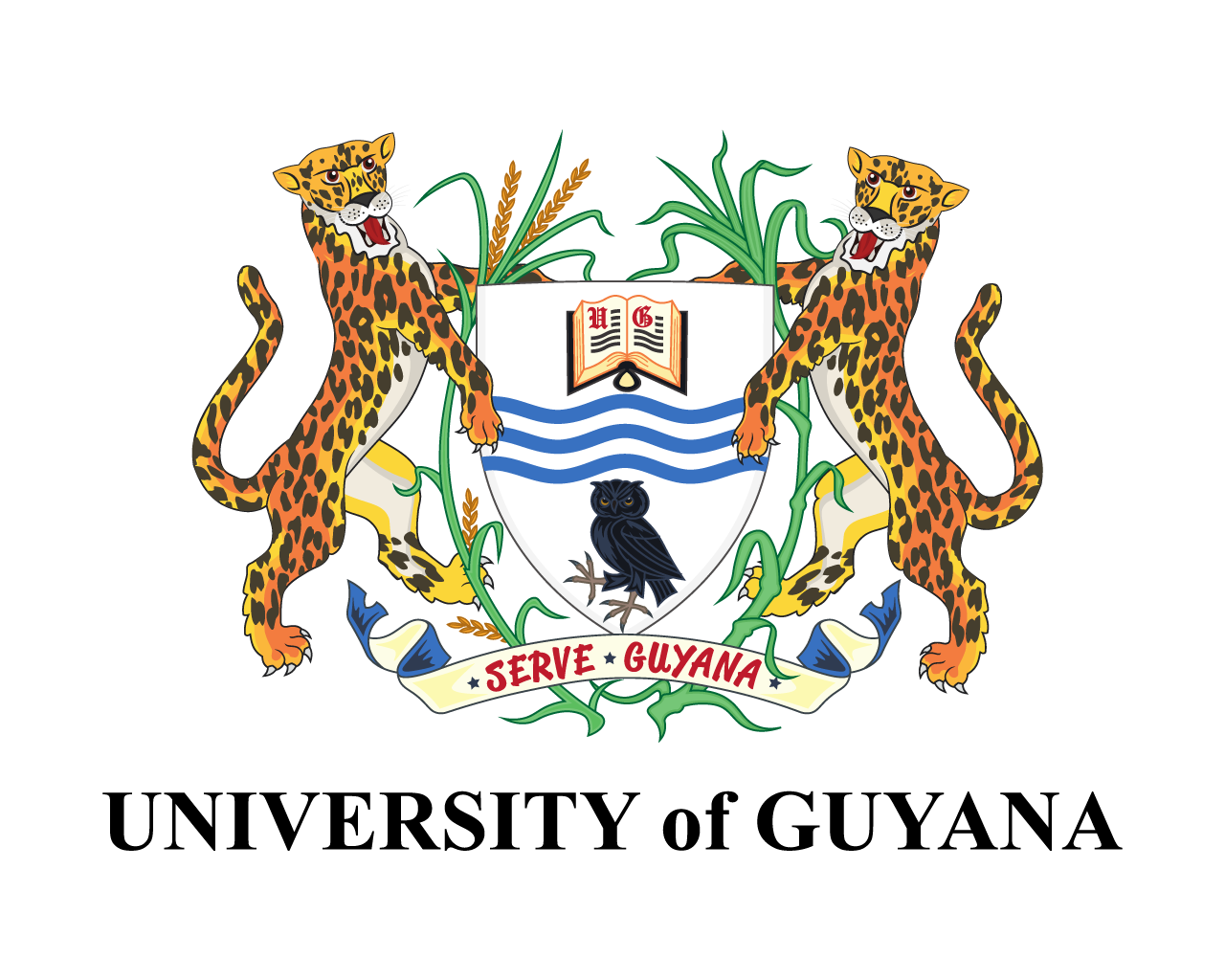
Policy for Management of Courses and Assessment in Emergency Mode
Wednesday, June 24, 2020 - 10:53WITH SPECIAL REFERENCE TO NCV 19
**************
-
Background: This emergency policy document responds to requests from Faculty and Students for a clear policy direction regarding course management and assessment in the disrupted semester 2 of academic year 2019-2020 due to the requirements of physical distancing and hard lockdown in order to arrest and subdue the nCov19 pandemic in Guyana.
-
Applicability: Though there is room for exception, this policy shall be applicable to all academic departments within the University of Guyana structure until the safe mode period has ended.
-
This policy is written to cover any extended emergency conditions or any future conditions which require remote or virtual work to be done. It may therefore be triggered in any such future conditions unless superseded by another policy or order from the relevant University bodies.
-
Exceptions: Exceptions to these guidelines will be justifiable by written case presented to the Academic Policy and Planning Committee (AP&PC) for hearing and decision and to the Academic Board for ratification.
-
This document is considered a living document as therefore may be updated and amended as necessary.
-
The overarching nature of this policy is supplemented by specific faculty plans reviewed and approved through AP&PC by the Deputy Vice-Chancellor for Academics and are appended in the full version of the document.
GUIDING PRINCIPLES
- Principle of Completion: Priority is to be given to Final Year Students: Where resources are limited or special consideration is required all considerations and especial assistance must be given to support the completion of all course for students on track for graduation in 2019-2020 academic year.
- Principle of Veracity: All grades must be verifiable and must adhere to at least 75% of the original teaching and learning outcomes of the course. All variations must be justified and approved at level of Departments and Faculty.
- A graduation is expected to be held late December 2020 providing all things return to safety by September 2020.
- However, a second graduation already on the university books which allows for a graduation in April 2021 might also be considered a safer option for those students who may not be able to complete essential labs and attachments by November 2020.
- Scheduling: The Registry has produced a revised academic schedule which should be once it is agreed upon annexed to this document as the advice on scheduling and deadlines going forward.
- Principle of Student-centered Flexibility: While boundaries and limits to extensions and other forms of relief are recognised, as far as possible a flexible, student-centered approach should be adopted by all faculty and staff. There should be a focus on student success rather than rigid rule adherence.
- Students with Special Needs are to be given as much support and space in which to cope with the pandemic/emergency as they navigate their studies with no penalty.
- The “one eighth” principle or theory applies. Most degree programmes run for 4 years (8 semesters). This is one unusual semester in which the final exam is lost. Additionally, the prevailing pandemic conditions will deprive some courses of a certain amount of breadth and rigor. But this is only one out of 8 semesters - one-eighth of the programme. The thoroughness of the other 7 will compensate for this one, and the students will still have a good programme.
NO FINAL EXAMS BUT VARIOUS FORMS OF ASSESSMENTS: Given the need for physical distance and for limiting the possibility of gross contamination of the virus amongst staff and students, and because there is no foreseeable end to this situation in this semester, there can be no final exams as they have been constructed in the past. However, there is still need for a robust final assessment for each course. There must be a series of viable and robust means of assigning a final grade for each course taught by lecturers for each student who takes the course.
- Forms of Assessment: The University’s proposed policy is that these various forms of assessments scheduled for the months of June-July 2020 should be based on the work done in the Faculty of Education and Humanities in addition to some universal and UG specific guiding principles:
ASSESSMENT MODALITIES:
In view of the above, the following overarching guidance is given to the Faculty for producing end of semester scores in relation to this semester. Where exceptions have been approved, they should be found in the appendices of this document.
- Calculation of the best 90% of all Course-Work Grades from any, or any combination of a. Assignments b. Class Tests (if possible) c. Practical work (if possible) d. Research Paper(s) e. Action evaluations and projects.
- Pilot Online Tests - The University would have completed integration of a test software with its Moodle teaching platform by May 10. Any number of lecturers using Moodle.uog.edu.gy can test this software. If it is used in test mode, we recommend short 15-minute tests or a series of these tests per module. But the student and lecturer must have the ability to discard these tests if they are deemed to have problems and students must be told that this a pilot and given the option to choose this or another assessment exercise.
- In scheduling, administration and management of tests online as pilots and tests online as final evaluations the Faculty/department/Registry and Department of Software services will collaborate on a protocol which will be reviewed on agreed upon by APP and Academic Board.
- Wet Labs/Field Trips/Internships/ Practicum and Experiments – Classes with Wet Labs/Field Trips/Internships/ Practicum and Experiments are required to use creative scheduling to address the matter of whether it would be safe and practical to run continuous labs/field assignments for students in full gear and with only 3 or 4 students at least 6 feet in every direction apart in these labs during the months of July, AUG and Sept 2020.
- Otherwise, if it is believed to be too risky or not possible to conduct labs in safe mode, all other coursework except for the wet labs/fieldwork/practicum etc. are to be completed online as far as possible and those other aspects of the courses/labs/fieldwork which cannot be done at this time and in safe mode (online or otherwise safe) must be re-scheduled to the earliest date possible which is verified and agreed as safe to conduct in the typical setting. This is to be the considered call of the departments but any decisions to implement wet lab protocols must be considered and approved by AP&PC and ACADEMIC Board before they are implemented. As such treatment of these parts of instruction should be included in the Faculty specific appendices attached hereto.
RELIEF MEASURES
- STUDENTS PERFORMING ESSENTIAL SERVICES: We salute all those alumni and current students who are providing essential services during this period - health workers, security, CDC, social services, key financial services, custodial workers, ICT experts, farmers, transport services among others. Student on call or “in line” or working on the national response to NCV 19 will need extra time to complete assignments etc. They are to be given as much time as needed to complete. If at the time of submission of course grades they are still unable to submit assignments, they must be given an “Incomplete” and Not an “F”. Whenever they are able to complete the assignment a fair grade must be given.
- Students who are stressed are to be given time to produce or to take a mental break without penalty.This may mean for this semester only, relaxing regulations on being able to bring coursework already completed from the same course in one semester to the makeup course in a next. It is agreed that this will be allowed.
- Students who have not paid or fully paid but who had registered in part or are continuing are to be allowed to take the full course including final assessment as a relief measure in this semester. Relevant policy bodies are discussing ways to address this funding gap.
- Students shall retain the right of review (appeal) a final grade for this semester even though a final examination was not conducted. The period for review must be within 2 weeks of the grade being published.
Summary of Decisions
- These measures will be used for any national and local emergencies or disruption to the campuses and/ or IDCE centres.
- Activation of Statute 16(3) allowed Academic Board to receive and trigger these policy guidelines for unprecedented emergency situations in the future.
- These measures can be amended without any major discourses being required.
- Graded courses shall continue to be so graded and that the pass/ fail option will only apply to those courses for which this was already approved by the Academic Board.
- There is to be a “make-up” semester for those courses which were not completed in semester II 2019/2020.
- Coursework marks (grades) will be carried over to this “make-up” semester.
- There will be end of semester assessments but no final exams for those courses for which this will be permitted. Note that some courses are governed by what is acceptable to accrediting and other admitting bodies (e, g Law and Medicine).
- Faculties and Departments are to propose the new assessment modes and their flexibility and robustness based on requirements of each particular course. This includes determining the weighting of assessments leading to each final grade.
- As far as their capacity will allow Faculties and Departments are expected to support student’s success and pay particular attention to students who have specific and differential abilities during the emergency environment.
- Students retain the right of review (appeal) even though a final examination was not conducted.
- The registry is to be the custodian of final assessment instruments (question paper and rubric) in the event of the need for a review. A copy should be sent to HoD and Registry If the Moodle platform is not being used. In case of Moodle all exams and assessment tools will be stored on a secure server within the University internet system for quality control and review.
- In this semester only students will not be debarred from writing the assessments for a course owing to an inability to meet the deadline for payment of fees.
- Final exams for final year students in the MBBS, Dentistry and Optometry (perhaps) programmes will be facilitated in the August-October period.
- Fourth year students in the MBBS and Dentistry programmes will be allowed to do their rotations in the August-October period.
- With respect to summer programmes students who are on track to graduate this academic year under existing guidelines will be prioritized. Faculties will decide on which courses to deliver for the summer /recess period based on the numbers, and online capacities of both students and teaching staff.
- A summer timetable will be available at the end of June and SRMS will be opened for those courses which will be offered.
- Please continue to check UG’s official online channels for updates (UOG website, HRMIS and SRMS).
- This is a summary document. The full text of the policy can be found on the UoG website documents section.
